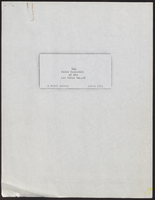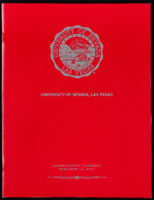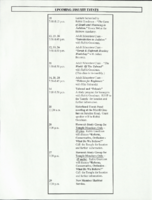Search the Special Collections and Archives Portal
Search Results
Juanita Greer White Papers
Identifier
Abstract
The collection is comprised of the personal, professional and business papers of Dr. Juanita Greer White from 1927 to 1980. Included are correspondence, booklets, dissertations, minutes, newsletters, newspaper clippings, and various other materials linked to women's organizations and Nevada organizations relating to education, health, and aging. Other material includes documents from her work in the Nevada State Legislature, books, catalogs, chemistry papers, plaques, and campaign materials.
Archival Collection
Adele Baratz Papers
Identifier
Abstract
The Adele Baratz papers mainly consist of photographs documenting Adele Baratz's life in Las Vegas, Nevada from the 1930s to 2010. An essay and list of names written by Baratz's brother, Charles Salton, document the early history of the Jewish community in Las Vegas.
Archival Collection

Antioco Carrillo interview, 2019: transcript
Date
Archival Collection
Description
Interviewed by Monserrath Hernández, Rodrigo Vazquez, and Laurents Benitez-Bañuelos. A native of Jalisco, Mexico, moved to Las Vegas when he was about 20-year old in 1987. Attended CSN and UNLV. His history with Las Vegas is embedded in the 1980s Las Vegas gay scene and education for AIDS. He is and activist and the Executive Director of Aid for AIDS of Nevada. He and Theodore Small are the first same-sex marriage in Nevada.
Text

The water resources of the Las Vegas Valley: a brief survey, March 27, 1931
Date
Archival Collection
Description
Overview of the water resources in the Las Vegas Valley, includes maps
Text

University of Nevada, Las Vegas (UNLV) Fall 2021 commencement program
Date
Archival Collection
Description
Commencement program from University of Nevada, Las Vegas Commencement Programs and Graduation Lists (UA-00115).
Text

Magdalena Martinez oral history interview: transcript
Date
Archival Collection
Description
Oral history interview with Magdalena Martinez conducted by Monserrath Hernandez and Barbara Tabach on April 4, 2019 for the Latinx Voices of Southern Nevada Oral History Project. In this interview, Magdalena Martinez recalls her childhood and growing up in Los Angeles, California. Martinez's parents are from Durango, Mexico, and immigrated to the United States in the 1970s. Martinez describes the generational differences that the women in her family faced and how the feminist movement of the 1970s did not resonate with women of color. Her family moved to Las Vegas in 1986 where she attended Bishop Gorman High School. After transferring to the University of Nevada, Las Vegas (UNLV) from community college and joining a student organization that would later become Student Organization of Latinxs, she became an early member of the Latino Youth Leadership Conference (LYLC) sponsored by the Latin Chamber of Commerce. Martinez describes how the LYLC has evolved over the years, and talks about her role in those changes. She discusses past work for CSN, NSHE, and currently is the Director of Education Programs with the Lincy Institute.
Text

Carole Fisher oral history interview: transcript
Date
Archival Collection
Description
Oral history interview with Carole Fisher conducted by Barbara Tabach on December 14, 2016 for the Southern Nevada Jewish Heritage Project. In this interview, Fisher discusses her family background and moving to Las Vegas, Nevada in 1979. Fisher talks about Nathan Adelson Hospice, programs that they provide for the Las Vegas senior community, and the increase of hospices in Las Vegas. She describes how Nathan Adelson Hospice is able to provide care for uninsured people, fundraising events they organize, and how their hospice differs from traditional hospital care. Lastly, Fisher discusses the significance of death in the Jewish religion.
Text
Olivia Diaz (City of Las Vegas Councilwoman) oral history interview conducted by Magdalena Martinez: transcript
Date
Archival Collection
Description
From the Lincy Institute "Perspectives from the COVID-19 Pandemic" Oral History Project (MS-01178) -- Elected official interviews file.
Text

Minutes from Temple Beth Sholom Board of Directors meetings, 1998
Date
Archival Collection
Description
Meeting minutes include reports from committees of the board, correspondence, and balance sheets.
Text

David Becker oral history interview: transcript
Date
Archival Collection
Description
Oral history interview with David Becker conducted by Claytee D. White and Barbara Tabach on May 15, 2018 for the Remembering 1 October Oral History Project. In this interview, Becker recalls being on a three-day assignment at the Route 91 Harvest Country Music Festival across from the Mandalay Bay Resort in Las Vegas, Nevada. Thinking the gunfire was produced by malfunctioning equipment, he took photos of the scattering crowd. Moments later, in a now silent venue, he realized he captured a horrific massacre. Becker recalls photographing people leaving the venue as they performed acts of heroism, helping the fallen or the slow to reach safety. He discusses how difficult it is to comprehend the acts of that night, and how his photojournalist instincts allowed him to capture such devastating images.
Text
